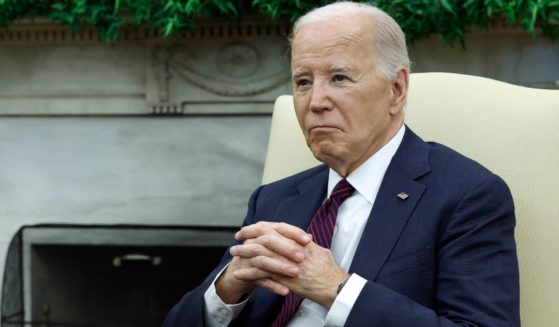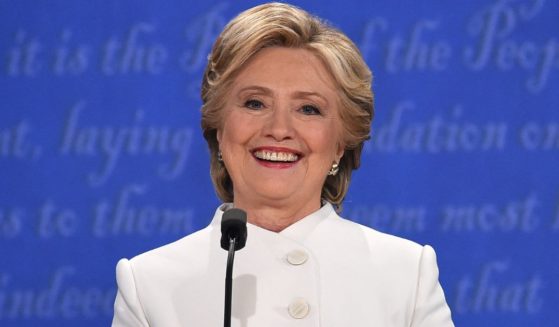Trump Official's Notes on UN Racism Doc Leak, Leave CNN Melting Down on Air
One look at the description on the YouTube video of this exchange and you can tell exactly what CNN thinks: “A Trump administration appointee to the State Department tore into standard UN documents that condemn racism as a threat to democracy.”
That sounds pretty awful, doesn’t it? State Department Deputy Assistant Secretary for Refugees and Migration Andrew Veprek’s leaked notes on a United Nations document putatively concerning racism was the subject of a late-June two-minutes hate from CNN’s Jake Tapper and friends (extended to roughly eight minutes because, hey, they’ve got 24 hours of airtime to fill).
CNN’s chyron was panicked: “Exclusive: Trump appointee disputed idea that leaders need to condemn hate speech in edits to U.N. documents.” Oh, and the network also used a shadowy silhouette to represent Veprek instead of an actual picture, because that’s really scary. Well, if that won’t have you running to Walmart to try to buy one of those “Impeach 45” T-shirts, I don’t know what will.
The problems with the documents — reported only after the vague intimation Veprek was a sort of racist quisling, and then given relatively short shrift considering the gravity of what CNN was implying — were actually pretty self-evident.
Deliberately vague and produced by one of the most dysfunctional and bigoted tendrils of the United Nations, there were definite issues that could be weaponized against unpopular democracies, including the United States and Israel.
Let’s start with the documents itself, one innocuously named “The Incompatibility between Democracy and Racism.” Sounds great, totally agree.
Then one looks at who produced the document: The ironically named U.N. Human Rights Council, the august defender of democracy that currently includes shining cities on the hill like China, Cuba, the Democratic Republic of the Congo, Pakistan, the Philippines, Saudi Arabia and Venezuela, among other countries with sterling records on democracy and human rights. (This, just in case you needed reminding, is the committee we recently walked out on because its one overarching goal seems to be fomenting anti-Israel sentiment.)
But let’s look at the document instead of the fetid caucus that produced it. While it contains standard resolutions that are typically renewed and altered every few years, the world has changed significantly since it was first passed.
None of the concepts it censures — like “xenophobia,” “populism” and “nationalism” — are actually defined with any degree of accuracy. While actual xenophobia is prima facie awful and populism and nationalism can transmute themselves into very ugly ends, all are still very subjective concepts unless they’re rigorously defined. That they aren’t is an especially dangerous thing in 2018, particularly in a committee where attachés from Beijing, Havana and Islamabad will be using the document for their own political ends.
Veprek took particular exception to phrases that sound particularly great to U.N. emissaries who commute regularly between the Upper East Side and Geneva but less palatable to residents of the global body’s constituent states.
“The drafters say ‘populism and nationalism’ as if these are dirty words,” Veprek wrote. “There are millions of Americans who likely would describe themselves as adhering to these concepts. (Maybe even the President.). So are we looking to here condemn our fellow-citizens, those who pay our salaries?”
Veprek also took issue with a portion of the document stressing the need for multicultural societies, arguing, “What’s the evidence for such ‘complementarity?’ Some commentators assert that a unifying culture (as opposed to multiculturalism) is the best way to promote social trust and combat racism.”
When it came to the usage of the term “xenophobia,” Veprek noted the problematic nature of “the malleability of the term now and in the future.”
There’s also another vague statement regarding the duty of leaders to condemn hate speech that drew Veprek’s attention: “‘Duty to condemn’ goes too far. Our public figures can’t be obliged to police every intolerant thought out their (sic) at the risk of being condemned for intolerance themselves,” Veprek wrote.
In another document, “The Importance of Preventing War Crimes and Genocide,” Veprek also struck out praise for the outgoing high commissioner for human rights, one who has accused the President Donald Trump of “incitement for others to attack journalists.” The fact that this is controversial within the Trump administration is apparently unacceptable to the folks at CNN.
But then, the fact that these are deliberately equivocal documents that could — in our current climate — be used to browbeat the Trump administration, Israel and other nations or movements that aren’t racist or ethnocentric but remain unpopular at the United Nations remained unmentioned by either CNN’s Michelle Kosinski or Jake Tapper:
Both noted that the State Department wouldn’t comment on the leaked edits or whether they were presented to the Human Rights Council before we left the body. However, Kosinski characterized Veprek’s edits as essentially questioning “why are we calling out political parties who are accused of racist speech?”
Which actually isn’t what was said — Veprek was noting the relative impossibility of our political leaders to police every movement the U.N. considers hateful, or even whether such policing would be effective against these movements.
Kristen Powers, a CNN political analyst, waded further into the swamp of demagogy.
“I mean, we look at the words that he’s objecting to — condemning racism? How is that out of bounds? That’s where we’ve come to is that now we’re actually going to say it’s dangerous to condemn racism.”
Except that he’s not. In addition to the old standby Trump-era argument of “this is where we’ve come to,” none of the rest of what she said was factually accurate, either. Veprek was condemning the vagueness of the document, especially in the context of the committee that created it. How difficult is this to understand?
Even Kosinski was compelled to correct Powers and call her out, although just seconds later she agreed with Tapper when he said Veprek was “saying whether (racism is) compatible with democracy.” That’s clearly, again, not what he’s saying.
This isn’t the kind of Fukushima meltdown you’ll regularly encounter on MSNBC, but it’s clearly Three Mile Island territory. I suppose there’s a certain subjectivity when anyone reads a political document, but everyone on this panel had a take on it that was very objectively false.
Powers would later say that “xenophobia” isn’t really malleable — except that it completely is, particularly when you consider that this is a document produced by a committee preternaturally preoccupied with documenting the fabricated perfidies of Israel.
Powers was clearly the star of this dumpster inferno; every statement she made was either demonstrably false or denuded of any context whatsoever. Let’s not neglect Jake Tapper’s performance, though.
He was in full-on faux-outrage mode, almost as if he were covering a story about David Duke or some such degenerate. Tapper can occasionally do real journalism, but whenever he adopts the furrowed rictus you see here, a torrent of carefully manufactured newspeak will follow as certainly as the return of the swallows to San Juan Capistrano. (Provided, of course, those swallows use copious amounts of hair product to give them that dry, fluffy-yet-slicked-back look.)
So, in short, a Trump official noting that U.N. documents on racism and human rights are deliberately vague and problematic is cause for apoplectic outrage. As Kristen Powers so eloquently put it, that’s where we’ve come to.
Nice work, CNN. This is why you’ve moved from a legitimate (if left-leaning) journalistic enterprise into comfort food for the left and/or what travelers are forced to watch when there are thunderstorms around the airport and their plane isn’t taking off anytime soon.
Truth and Accuracy
We are committed to truth and accuracy in all of our journalism. Read our editorial standards.












